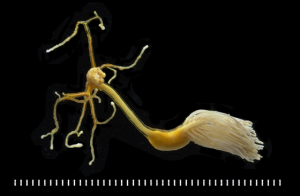 Coral reefs are hotspots for biodiversity, both for invertebrates and vertebrates. Many marine species spend all or parts of their life on reefs, benefitting from its productivity and structural habitat. Reefs are also very important for humans as they provide economic benefits in terms of tourism, fisheries, and protection of shorelines from storms and waves. Ocean acidification and climate change are threatening the health of coral reefs and the animals dependent on these unique habitats.
Coral reefs are hotspots for biodiversity, both for invertebrates and vertebrates. Many marine species spend all or parts of their life on reefs, benefitting from its productivity and structural habitat. Reefs are also very important for humans as they provide economic benefits in terms of tourism, fisheries, and protection of shorelines from storms and waves. Ocean acidification and climate change are threatening the health of coral reefs and the animals dependent on these unique habitats.
 In terms of diversity of fishes, coral reefs support thousands of species. Less well known is the fact that fish also represent habitats for a wide range of parasites associated with their guts, gills, and exterior surfaces. Extinction of the host fish species might as well mean co-extinction of the parasites.
In terms of diversity of fishes, coral reefs support thousands of species. Less well known is the fact that fish also represent habitats for a wide range of parasites associated with their guts, gills, and exterior surfaces. Extinction of the host fish species might as well mean co-extinction of the parasites.
Justine and colleagues present in their work, published this week in Aquatic Biosystems, a comprehensive overview on the biodiversity of parasites associated with three families of coral reef fishes in New Caledonia, demonstrating that with the extinction of a single fish species, a co-extinction of around ten parasitic species might occur.
With thanks to the authors for the above images.
Professor Uli Stingl, Section Editor for Aquatic Biosystems

- March biology highlights: octopuses, heavy metal, and pocket-sized DNA sequencing - 10th April 2015
- From farm to plate, make food safe! - 7th April 2015
- Dried up! The effects of 2014 on Western US Lake Ecosystems - 13th November 2014
One Comment